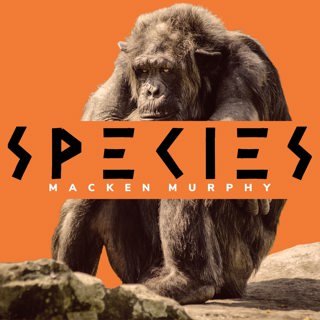
Raven
Ravens are so smart it's stupid. They use trickery, tools, communication, cooperation and betrayal to get ahead in the world. Come listen to some insane raven anecdotes, and get the answers to these questions: Why are there ravens in the Tower of London? Why do ravens fly towards gunfire? What do ravens, ants, humans and bees all have in common? Find out about the common raven, Corvus corax, on this episode of Species. Bibliography: https://docs.google.com/document/d/1zoOfHpZ8skzSMZ6U9DlYPEHhKKr9mmb4iK9yTDaUs18/edit?usp=sharing
6 Tammi 201920min

Electric Eel
The most powerful and dangerous electric fish in the entire world. Yes, they're real. Yes, they could kill you. Yes, they are insanely big. How do they generate electricity with their bodies? Can they use their electric fields to navigate? Have they invented an electric language? How come they don't shock themselves when they shock you? Find out all on this episode of Species. Bibliography: https://docs.google.com/document/d/1kaXRVKBZVK242pS6J2pSxsccVspSfk6Kyuh8xi6Zg4U/edit?usp=sharing
31 Joulu 201821min

Vaquita
The vaquita is a tiny, adorable, panda-like porpoise, and they need your help. Listen to this episode fast, because sadly, it could expire any day. Species does not cover extinct animals, and this animal is on the brink. Find out all about the $20,000 bladder, the Chinese black market, and a guy who is not related to Chuck Norris on this episode of Species. Bibliography: https://docs.google.com/document/d/11DkxAo-HitnUmWuoix3Dli5z3JUNkekfWWsSUmPonIw/edit?usp=sharing
24 Joulu 201818min

Tree Lobster
This isn't actually a lobster, and they don't live in trees anymore. This is the rarest insect on earth. The Lord Howe Island stick insect. Dryococelus australis. Considered extinct for decades and hidden for almost a century, this creature is unique, and they have an amazing story. Come listen and learn all about them! Bibliography: https://docs.google.com/document/d/1rQ-E6um6w6N9dh_OUScPt_VKhwMT_5ZEUDDff9KkCs8/edit?usp=sharing Support Species: speciespodcast.com/donate
16 Joulu 201820min

Bonus: Right under our noses...
Humans are the only animals on earth that have chins. Seriously. Look at your dog. Do they have a chin? Nope. Cat? No. Lions, tigers bears? Oh my! No, they do not have chins! Why did chins evolve in humans, when they literally haven't evolved anywhere else? Today we turn to the JD Pampush and DJ Daegling to explore the possible answers. Bibliography: https://docs.google.com/document/d/1Mn1Ya8gwk52JPBTFIh8-pfpXa1BLwzp5kgnYpJkGeLs/edit?usp=sharing Donate: www.speciespodcast.com/donate
11 Joulu 20187min

Shoebill
This animal is the baddest bird on the face of the planet: They decapitate crocodiles and deliberately defecate on their own legs. Why? Listen to find out. This bird is bad to the bone from the moment their born. Come learn all about the creature, and finally discover whether or not birds are dinosaurs on this episode of Species. Bibliography: https://docs.google.com/document/d/1EbSO3bks7w2jy1vIDPDapLqmZVZlmBIFT7HtZR3Ody8/edit?usp=sharing Support the Show: https://www.speciespodcast.com/donate
9 Joulu 201820min

Epaulette Shark
WARNING: This shark can walk on land. Nobody is safe. If you are easily upset by the concept of sharks, specifically those that can walk on land, this podcast may not be the one for you. Everybody else, come have some family-friendly fun and listen to the science of how a fish can survive up here with the rest of us! Also, learn about the first life to walk on earth, and hear the science behind gills and adaptive radiation on this episode of Species. Bibliography: https://docs.google.com/document/d/1RGIbcHabAAdUJGWzUX0HFvkTM3n-VhBV-UyzLKkVF3k/edit?usp=sharing Support Species: https://www.speciespodcast.com/donate
2 Joulu 201814min

Potto
What has two tongues, spikes on their vertebrae, a "toilet claw," a tooth comb, and no index finger? The Potto. Perodicticus potto. Come learn all about an amazing animal, hear a heartbreaking story, and get an explanation for their strange body on this episode of Species. Bibliography: https://docs.google.com/document/d/1QafZ6UU_G8l_m8WnPBqzJ0TQrCtswffUkAlKnWMfe1I/edit?usp=sharing
25 Marras 201819min




















